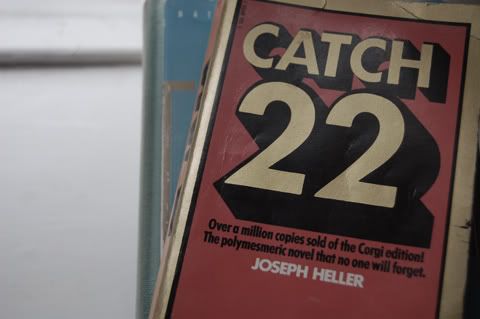
One of those books that sat on the ‘to read, eventually’ pile for years: I finally picked up an old yellowed edition of Catch-22 for £1 at my local Oxfam bookshop. My initial reaction was like a deer in headlights; dazzled by the sheer shambolic anarchy I suddenly found myself in, I didn’t know how to make sense of it, or if it was actually supposed to make sense – chronology slipped here, there and everywhere, character descriptions were delightfully contradictory, events bordered on absurd and then became absurd entirely.
Now, I like a little literary confusion and invention (I actually read all of Ulysses once, in university. True story), so I was intrigued, and had my suspicions that it could be much more cohesive and sensical (how is this not a word?) than initial impressions suggested. Not that non-cohesive and nonsensical books forego entertainment or enjoyment, but I admit that sometimes what works for the intellect can negate what works for the emotions when it comes to writing. So would it be an intellectual or purely literary exercise then? Well; partly. But it combined emotional engagement with a truly illogical world and an obviously apparent literary structure that worked for rather than against that engagement. And in a way that no other medium, I think, could do, it played with the inherent nature of literature and surprised me with its uniqueness. In short: it is brilliant. It had me mesmerised until that final, fleeting, perfect ending. It is unlike any other novel I've read, and possibly the best piece of anti-war writing I've come across. Have you read it? What was your take?


 Writer, editor, coffee drinker.
Writer, editor, coffee drinker.









No comments:
Post a Comment